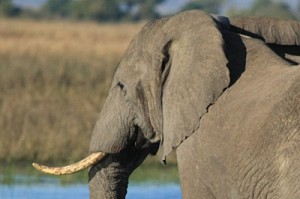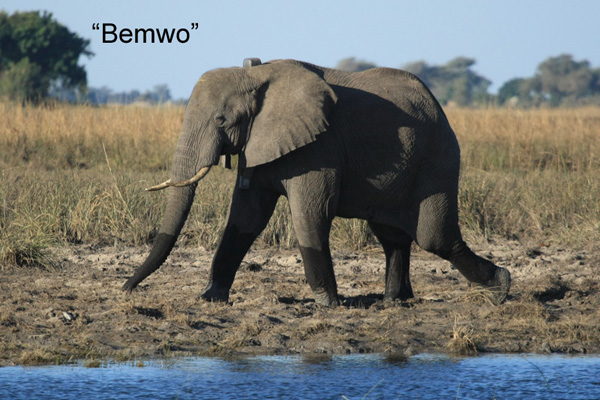Elephant CH42, known as ‘Bemwo’, appropriately named by sponsors from BMW, was fitted with a satellite-tracking collar in June 2010 as part of Elephants Without Borders ongoing elephant movement study. He was collared along the banks of the Chobe River in Chobe National Park, where he was often sighted by visiting tourists. He was a well known “regular” in Chobe, his wanderings encompassed the entire riverfront between Sedudu to Ngoma gates, the Chobe Enclave, and adjoining forest reserves. As he was so frequently sighted, he was an ambassador for EWB, providing an opportunity for guides to explain our projects elephant conservation efforts.

Popular Bemwo was frequently sighted along the river
In December, his collar suddenly stopped transmitting GPS locations, but losing a signal is not that uncommon, as it often happens when the satellite unit on the collar is caked with mud, is flipped, or even fallen off the elephant. Sometimes for whatever reason, the problem rectifies itself it and we receive transmission again. Unfortunately, in Bemwo’s case this did not happen and the last signal received was from a remote area, difficult to get to in the wet season.
Two weeks ago, while having a discussion regarding elephant movements in the region, with officials at Kasane’s anti-poaching office, I mentioned that one of our bull elephant’s collar had stopped transmitting. They asked for the co-ordinates and quickly responding, the next morning they flew to the point I had given them. Much to our despair, that afternoon, we received a call that they found 3 bull elephants that had been shot with their tusks missing; at the exact location we had given them. No collar was found and the anti-poaching team believed that the collar was buried in the vicinity of the carcasses. The patrol unit believed that the poachers may have still been in the area and were in pursuit following fresh human tracks.
Poaching has been on the rise all over Africa, which has captured the public’s attention for more to be done to combat this recent wave of illegal hunting. DWNP and the Botswana Defence Force (BDF) have vigilant anti-poaching units, but they face mammoth challenges. Despite recent intensified patrols both on foot and aerial reconnaissance with helicopters, the task is difficult due to a vast and often inaccessible region, which is close to international borders. Not only are the strategies being refined everyday; there is now also cross-border cooperation by law enforcement agencies among neighbouring countries. Positive news is that the anti-poaching efforts are now beginning to pay off, as a number of encounters and arrests have been made.
According to a recent article, Mobile Bolele, the spokesperson of the Ministry of Environment, Wildlife and Tourism told the Botswana newspaper, the Sunday Standard “Two months ago, three suspected Zambian poachers were shot dead by the anti-poaching unit, but one of them managed to escape… while twelve elephant tusks were recovered from the dead poachers.” Bolele stated, that this month “in the Sibuyu Forest Reserve, a law enforcement patrol encountered a group of about six poachers. On being challenged, the suspected poachers started shooting and the law enforcement personnel fired back, resulting in one poacher being killed, one injured (and captured) and four escaping.” She said, “the patrol recovered some items used during poaching, such as skinning knives, 377 live ammunition for AK47 rifles, AK47 magazine, multi-purpose oil and weighing scale. She pointed out that Botswana will do everything to protect their natural resources.“
We are uncertain that it was these particular poachers that had killed Bemwo and the bulls he was with, but, if one considers the placement and timing of the recent incident, it is likely that the culprits have met their fate. We are saddened by the tragic loss of Bemwo and the unfortunate situation that poaching persists, however perhaps these recent encounters may have curbed activities in this area for a while. EWB express its gratitude to both DWNP and the BDF anti-poaching units for their quick response and unrelenting efforts to combat these illegal killings.

Bemwo's fate is tragic and he'll be missed on the Chobe riverfront
We are uncertain that it was these particular poachers that had killed Bemwo and the bulls he was with, but, if one considers the placement and timing of the recent incident, it is likely that the culprits have met their fate. We are saddened by the tragic loss of Bemwo and the unfortunate situation that poaching persists, however perhaps these recent encounters may have curbed activities in this area for a while. EWB express its gratitude to both DWNP and the BDF anti-poaching units for their quick response and unrelenting efforts to combat these illegal killingsElephant CH42, known as ‘Bemwo’, appropriately named by sponsors from BMW, was fitted with a satellite-tracking collar in June 2010 as part of Elephants Without Borders ongoing elephant movement study. He was collared along the banks of the Chobe River in Chobe National Park, where he was often sighted by visiting tourists. He was a well known “regular” in Chobe, his wanderings encompassed the entire riverfront between Sedudu to Ngoma gates, the Chobe Enclave, and adjoining forest reserves. As he was so frequently sighted, he was an ambassador for EWB, providing an opportunity for guides to explain our projects elephant conservation efforts.
In December, his collar suddenly stopped transmitting GPS locations, but losing a signal is not that uncommon, as it often happens when the satellite unit on the collar is caked with mud, is flipped, or even fallen off the elephant. Sometimes for whatever reason, the problem rectifies itself it and we receive transmission again. Unfortunately, in Bemwo’s case this did not happen and the last signal received was from a remote area, difficult to get to in the wet season.
Two weeks ago, while having a discussion regarding elephant movements in the region, with officials at Kasane’s anti-poaching office, I mentioned that one of our bull elephant’s collar had stopped transmitting. They asked for the co-ordinates and quickly responding, the next morning they flew to the point I had given them. Much to our despair, that afternoon, we received a call that they found 3 bull elephants that had been shot with their tusks missing; at the exact location we had given them. No collar was found and the anti-poaching team believed that the collar was buried in the vicinity of the carcasses. The patrol unit believed that the poachers may have still been in the area and were in pursuit following fresh human tracks.
Poaching has been on the rise all over Africa, which has captured the public’s attention for more to be done to combat this recent wave of illegal hunting. DWNP and the Botswana Defence Force (BDF) have vigilant anti-poaching units, but they face mammoth challenges. Despite recent intensified patrols both on foot and aerial reconnaissance with helicopters, the task is difficult due to a vast and often inaccessible region, which is close to international borders. Not only are the strategies being refined everyday; there is now also cross-border cooperation by law enforcement agencies among neighbouring countries. Positive news is that the anti-poaching efforts are now beginning to pay off, as a number of encounters and arrests have been made.
According to a recent article, Mobile Bolele, the spokesperson of the Ministry of Environment, Wildlife and Tourism told the Botswana newspaper, the Sunday Standard “Two months ago, three suspected Zambian poachers were shot dead by the anti-poaching unit, but one of them managed to escape… while twelve elephant tusks were recovered from the dead poachers.” Bolele stated, that this month “in the Sibuyu Forest Reserve, a law enforcement patrol encountered a group of about six poachers. On being challenged, the suspected poachers started shooting and the law enforcement personnel fired back, resulting in one poacher being killed, one injured (and captured) and four escaping.” She said, “the patrol recovered some items used during poaching, such as skinning knives, 377 live ammunition for AK47 rifles, AK47 magazine, multi-purpose oil and weighing scale. She pointed out that Botswana will do everything to protect their natural resources.“
We are uncertain that it was these particular poachers that had killed Bemwo and the bulls he was with, but, if one considers the placement and timing of the recent incident, it is likely that the culprits have met their fate. We are saddened by the tragic loss of Bemwo and the unfortunate situation that poaching persists, however perhaps these recent encounters may have curbed activities in this area for a while. EWB express its gratitude to both DWNP and the BDF anti-poaching units for their quick response and unrelenting efforts to combat these illegal killings.
Tags: africa, anti poaching, botswana, chobe, conservation, DWNP, elephants, elephants without borders, poach, research, wildlife










Very good blog, it really points out the problems we have today and shows whats going on with these poor animals. I love the information you provided it really got my attention and made me think.. Great! thanks